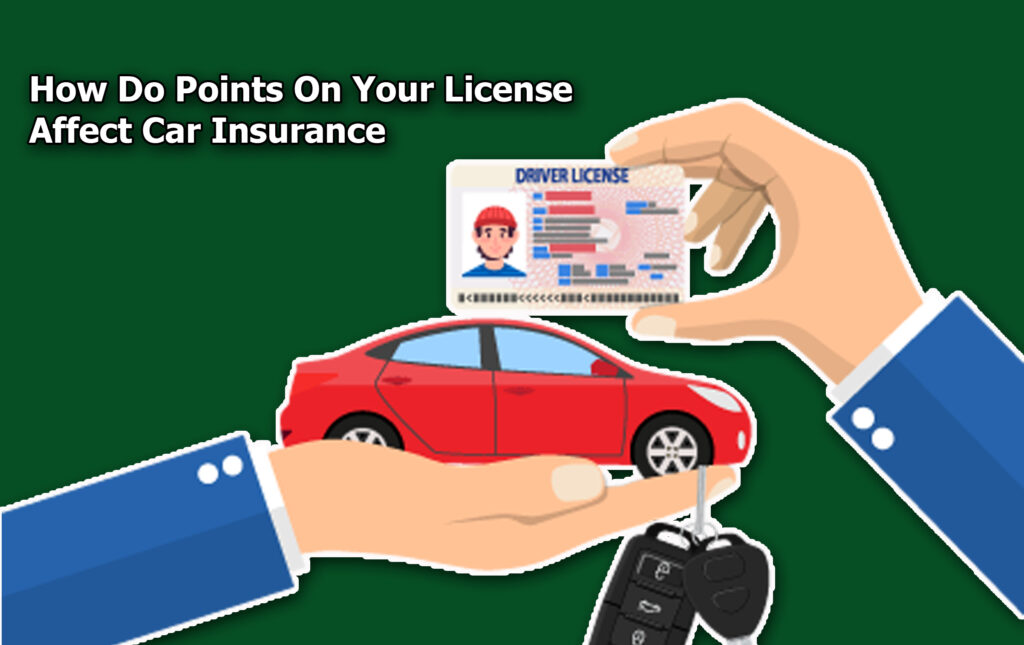How do points on my license affect my car insurance? If you’ve ever gotten a ticket or been in a small accident, you might’ve heard about points being added to your license. But what do those points really mean; and how do they affect your car insurance?

The truth is, even a few points can make a difference in what you pay each month. That’s because insurance companies use your driving record to figure out how risky you are to insure.
The more points you have, the more likely they are to raise your rates.
Whether the points come from speeding, running a red light, or something more serious, they stick around for a while and can cost you in the long run.
But don’t worry; there are ways to deal with them and even lower your insurance over time. In this article, we’ll explain how license points work, how they affect your insurance, and some simple tips to help you manage or reduce the impact on your wallet.
What Are License Points?
License points are marks added to your driving record when you break traffic rules. Think of them as a report card for your driving.
If you get a speeding ticket, cause an accident, or run a stop sign, you might get points depending on where you live and what the violation was.
Each state has its own system, but the idea is the same; more points mean more problems. If you get too many, your license could be suspended or even taken away for a while.
And long before that happens, your car insurance company might raise your rates because they see you as a higher risk to cover.
How Do License Points Affect Your Car Insurance?
Insurance companies check your driving record when deciding how much to charge you. If you have points, it usually means you’ve had tickets or accidents, and that can lead to higher premiums.
In some cases, even one or two points can make a difference.
Here’s why: insurers want to avoid risk. If your record shows that you’re more likely to get into trouble on the road, they may increase your monthly payments to protect themselves from potential costs.
The more serious the offense, the more your insurance could go up. For example:
- A minor speeding ticket might add a small amount to your bill.
- A DUI or reckless driving charge could raise your rate by hundreds of dollars a year—or even get your policy canceled.
How to Lower Your Insurance After Getting Points
Just because you have points on your license doesn’t mean you’re stuck with high insurance bills forever. Here are a few ways you can lower your rates, even with a less-than-perfect driving record:
Take a Defensive Driving Course
In many states, taking a certified defensive driving class can remove points from your record or at least show your insurance company that you’re serious about being safer on the road. It might even qualify you for a discount.
Shop Around for Better Rates
Not all insurance companies treat points the same way. Some might be more forgiving, especially if the violation was minor or happened a long time ago.
Get quotes from a few different insurers and compare your options, you might be surprised at the savings.
Drive Safely Moving Forward
Time is on your side if you avoid more trouble. Most points don’t stay on your record forever. If you can keep a clean driving history for a few years, your rates will likely go back down.
Ask About Discounts
Even if you have points, you might still qualify for other discounts; like bundling your car and home insurance, setting up automatic payments, or driving fewer miles each year.
Increase Your Deductible
If you’re willing to pay more out-of-pocket in case of an accident, your insurer might lower your monthly premium. Just make sure you have enough saved in case you need it.
Bottom Line
Getting points on your license can raise your car insurance rates, but it doesn’t have to break the bank.
The key is to understand how those points affect your premiums and take steps to improve your driving record over time.
With a bit of effort; like driving safely, shopping for better rates, and asking about discounts; you can lower your costs and get back on track. Mistakes happen, but they don’t have to follow you forever.



